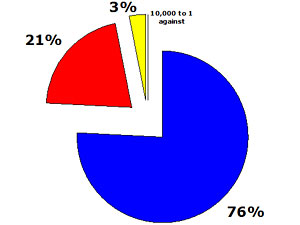



From March 14 to April 1, 2013, FIDE and AGON – the World Chess Federation’s commercial partner – are staging the 2013 Candidates Tournament for the World Chess Championship 2013. It will be the strongest tournament of its kind in history. The venue is The IET, 2 Savoy Place, London. The Prize Fund to be shared by the players totals €510,000. The winner of the Candidates will become the Challenger to Viswanathan Anand who has reigned as World Champion since 2007. The main sponsor for the Candidates is State Oil Company of the Azerbaijan Republic SOCAR, which has sponsored elite events chess in the past.
| Round 10 March 27 at 14:00 | ||
|
Magnus Carlsen
|
1-0
|
Boris Gelfand |
|
Levon Aronian
|
1-0
|
Vassily Ivanchuk |
|
Teimour Radjabov
|
½-½
|
Peter Svidler |
|
Alexander Grischuk
|
0-1
|
Vladimir Kramnik |
|
Playchess commentary: GM Yasser Seirawan
|
||
Magnus Carlsen kept his half point lead in round ten of the FIDE Candidates’ Tournament in London. On Monday the Norwegian ground down Boris Gelfand (Israel) with white in a Rossolimo Sicilian. His main rivals also won: Vladimir Kramnik (Russia) admitted that he was lucky as in a drawish Berlin Endgame Alexander Grischuk (Russia) blundered in time trouble, while the opponent of Levon Aronian (Armenia), Vassily Ivanchuk (Ukraine), overstepped the time limit for the fourth time in this tournament, after playing well in a Budapest Gambit. Dejected about his score with White so far, Teimour Radjabov (Azerbaijan) went for a quick draw against Peter Svidler (Russia) in a Grünfeld.
The following pictures (by Pascal Simon of ChessBase) are once again uncaptioned. If you have any difficulty identifying the players – for example because you are suffering from prosopagnosia – then you only need to consult the results table above. All the players are given in the order they appear in that table.
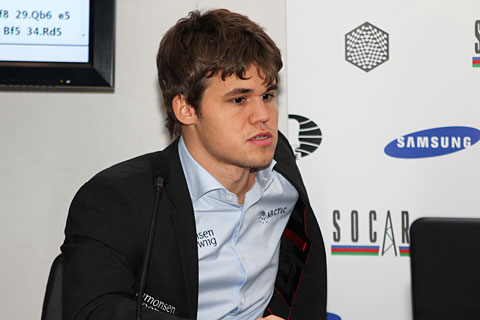

Magnus Carlsen slowly outplayed Boris Gelfand from a Rossolimo Sicilian. According
to the Norwegian, after the opening “White is slightly better but it's
of course very playable for Black.” After some forced moves Gelfand went
for the manoeuvre Qd8-b6-b3-c2 where computer engines prefer the passive 20…Qf8.
“What computers are missing is that the whole concept was to get the queen
active and to keep the white pieces paralysed. But I just missed one thing,”
said Gelfand. That thing was a deep tactic which forced the Israeli to change
his intended plan (Ra8-a1) and find something else at move 25. There were many
ways to defend in that phase, and after the press conference Gelfand stayed
around for about ten minutes, analysing blindfold with Jon Speelman and some
journalists.
Carlsen said that after his neat 28.Qa5!: "It’s clear that I’m
playing for two results” and he was happy with his 37.Qe2! as well. “I’m
happy to still be leading so I think I’ll just try do more of the same.
I wasn’t thrilled that the other two guys won their game but there’s
nothing you can do about that. And… I wasn’t sure that the Budapest
Gambit was what I wanted to see but I think I can only change what I do myself!
I just try to play and that’s what I’ll do for the rest of the tournament.”

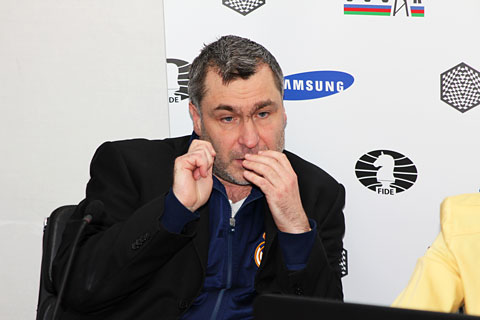
Against Levon Aronian Vassily Ivanchuk overstepped the time limit for the fourth
time already this tournament. By now we just have to mention German grandmaster
Fritz Sämisch (1896-1975), who at the age of 73 played two tournaments,
one in Büsum, Germany and another in Linköping, Sweden, where he lost
all games (fifteen in the former and thirteen in the latter) on time.
Ivanchuk’s opening play, however, is still as unpredictable as ever. “He’s
known to play any kind of opening so I just decided not to prepare much, keep
my head fresh,” said Aronian, who faced the rare Budapest Gambit this
time. The Armenian felt he played “a bit imprecise” in the early
middlegame, but after he found a double pawn sacrifice (going from one up to
one down), the tables turned. “After 26.g4 I have very good compensation.
I was actually quite happy with my position,” said Aronian.
By then Ivanchuk was yet again in horrible time trouble: after his 27th move
he had two and a half minutes left, and then his moves just didn’t get
through anymore. With playing 29…gxf5 (a losing move anyway) he left himself
with just one second for eleven moves! Aronian: “I’m happy to kind
of recover after a loss against Boris. Let’s see, let’s see. Still
many round to go!”
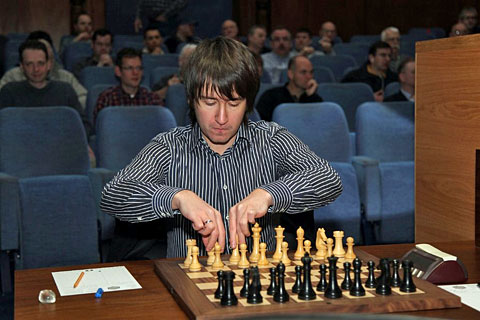

An hour and a half into the tenth round, the game between Teimour Radjabov
and Peter Svidler was already over. It’s about time to quote commentator
Nigel Short’s description of such games: it was a damp squib. Having repaired
his Grünfeld after his loss against Kramnik (“It wasn’t that
broken, to be honest” – Svidler), the Russian grandmaster again
went for his favourite defence but his opponent did manage to surprise him with
his 16th move. This “either caught me by surprise or I simply couldn’t
remember what my notes say,” commented Svidler, who continued playing
sensible moves.
All of a sudden Radjabov started repeating, as early as move 19. At some point
Svidler walked away from his board in his own time to get himself a cup of tea.
“The longer he thinks, the more likely he’ll agree to a draw!”
said Nigel Short. And indeed, Svidler did accept Radjabov’s silent draw
offer, arguing: “I don’t believe I’m better, I couldn’t
find any advantage after both 21…Qc3 and 21…Qa3.”
Radjabov: “Considering my amazing score with White in this tournament
(…) I decided that a draw is a very nice result. I am not the guy who
is here to lose all my games. I thought that if Peter would play for a win I
would also play for a win because there would be no other chance. There were
times in my life when I was very unsatisfied with a draw but now I think a draw
is an amazing result sometimes!”
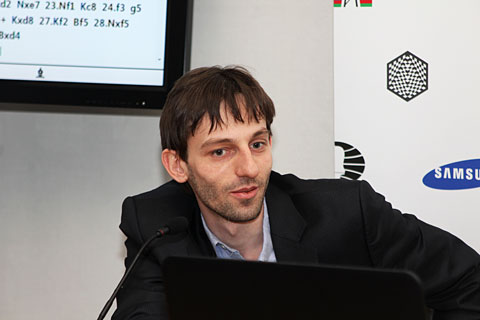
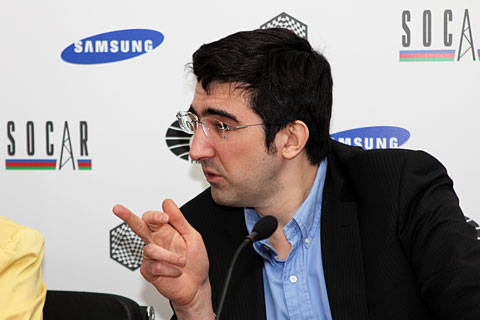
An hour and a half after the Radjabov-Svidler game, Alexander Grischuk resigned
his game against Vladimir Kramnik, who again brought back memories from his
match against Kasparov in London by playing his favourite Berlin Ending. “The
openings I played back in 2000 are working very well for me,” Kramnik
said, “but although I score well in this Berlin, in fact I hadn't won
a single classical game in it, only rapid and blitz.”
The 14th World Champion reached a comfortable position by “playing just
theoretical moves”, and around move 25 it was “quite drawish”.
Kramnik: “27…Bf5 was a clever move, there were a few traps.”
Meanwhile Grischuk, who described his position after the opening as “awful”,
was getting into time trouble. “I was not happy to get this position and
just defend. I didn’t know what to play.”
30.Bxd4 was “an awful blunder” said Kramnik: “In general I
was quite lucky; it should have been a draw. It’s quite unusual for me
to score half a point more out of nothing. Usually I give up points. For me
it's rare that somebody blunders. It was just a present. I am not used to these
kind of things. There are some players who are receiving this kind of presents
quite often, but not me.”
Report by Peter Doggers
With the three leaders all winning their Round 10 games, the odds for tournament victory didn't change too much in comparison to the odds after Round 9. Magnus Carlsen's chances of winning the tournament increased from 75% to 76%, Levon Aronian's chances stayed at 21%, and Vladimir Kramnik's chances have improved a bit thanks to his win with the black pieces. Here are the updated odds after Round 10:
| Name |
Score
|
games remaining | Odds of winning |
| Magnus Carlsen |
+4
|
2 white / 2 black | 76% chance |
| Levon Aronian |
+3
|
2 white / 2 black | 21% chance |
| Vladimir Kramnik |
+2
|
2 white / 2 black | 32 to 1 against |
| Alexander Grischuk |
–1
|
2 white / 2 black | 16,000 to 1 against |
| Peter Svidler |
–1
|
2 white / 2 black | 31,000 to 1 against |
| Boris Gelfand |
–1
|
2 white / 2 black | 2 million to 1 against |
| Vassily Ivanchuk |
–3
|
2 white / 2 black | no chance |
| Teimour Radjabov |
–3
|
2 white / 2 black | no chance |
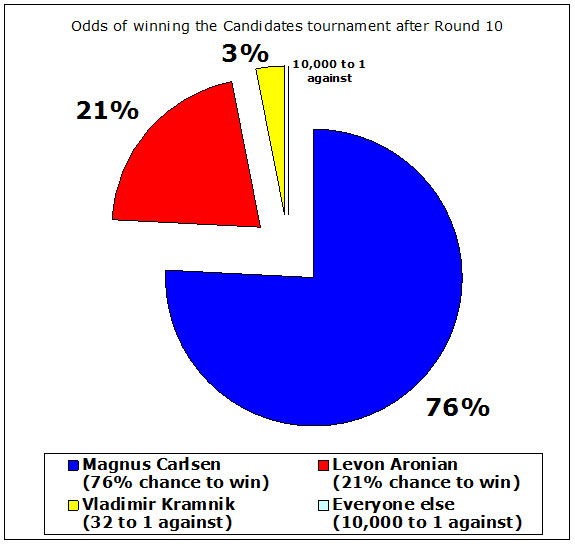
Boris Gelfand's remote chances of tournament victory are much worse than those of Alexander Grischuk or Peter Svidler, since Gelfand has already played Aronian and Carlsen twice, whereas Grischuk and Svidler still have games remaining against both Aronian and Carlsen, and therefore can pull the leaders down while also boosting their own score. And both Vassily Ivanchuk and Teimour Radjabov appear to be mathematically eliminated. Here are the chances of the various final outcomes, based on 10 million simulations of the final four rounds:
| Scenario | Likelihood |
| Carlsen wins outright | 71% chance |
| Aronian wins from tiebreaker #2 (most wins) | 12% chance |
| Aronian wins outright | 9% chance |
| Carlsen wins from tiebreaker #3 (Sonneborn-Berger) | 26 to 1 against |
| Kramnik wins outright | 58 to 1 against |
| Carlsen wins from tiebreaker #2 (most wins) | 87 to 1 against |
| Kramnik wins from tiebreaker #3 (Sonneborn-Berger) | 102 to 1 against |
| Aronian wins from tiebreaker #3 (Sonneborn-Berger) | 248 to 1 against |
| Rapids are required | 269 to 1 against |
| Any other outcome | 304 to 1 against |

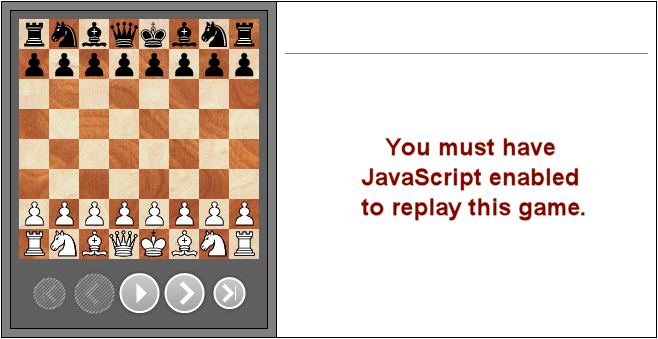
Select games from the dropdown menu above the board
|
|
||||||||||||||||||||||||||||||||||||
|
|
||||||||||||||||||||||||||||||||||||
|
|
||||||||||||||||||||||||||||||||||||
|
|
||||||||||||||||||||||||||||||||||||
|
|
||||||||||||||||||||||||||||||||||||
|
|
||||||||||||||||||||||||||||||||||||
|
|
||||||||||||||||||||||||||||||||||||
The games start at 14:00h = 2 p.m. London time = 15:00h European time, 17:00h Moscow, 8 a.m. New York. You can find your regional starting time here. Note that Britain and Europe switch to Summer time on March 31, so that the last two rounds will start an hour earlier for places that do not swich or have already done so (e.g. USA). The commentary on Playchess begins one hour after the start of the games and is free for premium members.
LinksThe games will be broadcast live on the official web site and on the chess server Playchess.com. If you are not a member you can download a free Playchess client there and get immediate access. You can also use ChessBase 12 or any of our Fritz compatible chess programs. |